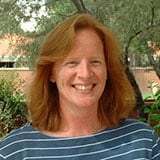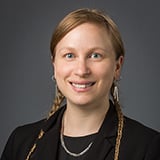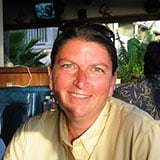Before the COVID-19 pandemic, University of Northern Colorado (UNC) students in the Master of Public Health (MPH) program would typically spend their first year attending night classes, in study groups with friends or cramming for an exam at a coffee shop. For the incoming cohort of 2020, the largest in recent years, earning a graduate degree online in a global pandemic has been anything but typical.
The Colorado School of Public Health at UNC, part of a tri-campus collaborative with Colorado State University and the University of Colorado Anschutz Medical Campus, shifted to completely remote-learning last March.
Faculty and students share their experiences
 Teresa Sharp, Ph.D., chair of the Department of Community Health Education at UNC, said, “Our move to remote learning has challenged both students and faculty. Many join our concentrations because they want to train and work in community agencies. Our students are outstanding, and it’s no wonder that many are landing public health positions.”
Teresa Sharp, Ph.D., chair of the Department of Community Health Education at UNC, said, “Our move to remote learning has challenged both students and faculty. Many join our concentrations because they want to train and work in community agencies. Our students are outstanding, and it’s no wonder that many are landing public health positions.”
 “ColoradoSPH students are required to gain hands-on experience through an internship, but I’m guessing most probably didn’t expect to be applying their skills so early in the program!” said Rose Grose, Ph.D., assistant professor of Community Health Education.
“ColoradoSPH students are required to gain hands-on experience through an internship, but I’m guessing most probably didn’t expect to be applying their skills so early in the program!” said Rose Grose, Ph.D., assistant professor of Community Health Education.
Michelle Delgado, a first-year MPH student, has worked for the Weld County Department of Public Health and Environment for a few years but shifted into her role on the front line as COVID-19 case investigator when the pandemic began.
Lisa Colon, who is in her final year at UNC, joined Delgado in October and both have been calling and interviewing positive cases to identify exposures and outbreaks, limit the spread of the virus and provide information and resources. When asked how their work relates to their education at UNC, Delgado said, “Being in the MPH program has taught me why it’s important to conduct an interview when people test positive for an infectious disease. I have more appreciation for public health workers and a greater understanding and passion for public health.”
Colon added, “I hope that the education I provide can put their worries at ease and help them feel competent and confident in passing important information along to loved ones to further stop the spread. I am very thankful for my program and how it has prepared me for a hands-on position in public health!”
Stephanie Halvorson, a UNC first-year student, is a COVID-19 contact tracing supervisor at the state-level Colorado Department of Public Health and Environment (CDPHE) in the COVID-19 Containment Response Corps. She oversees and supports 20 contact tracers engaged in case interviews.
“We are doing all we can to slow the community spread and provide health information to cases hard to reach, with a foundation in health equity,” Halvorson said. Halvorson is also the lead data manager for all regions in Colorado, handling data input, dashboards and the main data-tracking source for contact tracers, with an eye toward constant quality improvements.
“It is amazing to be at the frontlines of the data collection and information. As an MPH student, I am able to apply what I am learning and teach some concepts to my team,” Halvorson said. “I am grateful to be helping community members with resources.”
 “With COVID, things are constantly changing, that’s probably the hardest part of our job. We are an emergency response, and we are reminded of that daily,” Brianna Robles, a 2020 MPH graduate said to Grose’s Epidemiology class.
“With COVID, things are constantly changing, that’s probably the hardest part of our job. We are an emergency response, and we are reminded of that daily,” Brianna Robles, a 2020 MPH graduate said to Grose’s Epidemiology class.
Robles was hired in March 2020 as part of the very first group of 12 case investigators as the pandemic was ramping up in Colorado. A year later, she is a training coordinator and team supervisor for case investigators and contact tracers sharing her wisdom with current UNC students.
When asked what part of her degree she uses the most, Robles said, “Thankfully, because of the MPH program, I have a really good grasp of health equity. We’ve noticed that there are some cultures and languages that aren’t getting the resources and information that they need. We’re just now rolling out a Cultural Navigation Program, which is a special team of investigators working directly on cases and contacts that may have different cultural or language barriers.”
Delgado said that Weld County is one of the first local health departments to pilot the program to help refugees in the area understand the process and the importance of public health measures and is “excited to start doing that." '
Leah Brunner, a second-year MPH student, also works as a case investigator at CDPHE and as a nurse’s assistant in Greeley. She said, “I use the skills I learned in courses on a daily basis. Being able to work directly on the frontlines, I understand the important role public health plays in saving lives, not just during a pandemic.
 Liz Gilbert, Ed.D., a professor in the ColoradoSPH at UNC (image at right), is proud of the work MPH students are doing. “This year has been such a testament to how determined and resilient our students are. We talk to our students about how we can enter into communities in an authentic way. I never imagined that I would be asking our students how we would enter those communities authentically … via Zoom. They keep rising to the occasion,” she said.
Liz Gilbert, Ed.D., a professor in the ColoradoSPH at UNC (image at right), is proud of the work MPH students are doing. “This year has been such a testament to how determined and resilient our students are. We talk to our students about how we can enter into communities in an authentic way. I never imagined that I would be asking our students how we would enter those communities authentically … via Zoom. They keep rising to the occasion,” she said.
Applications are being accepted until May 1 for MPH degrees in Community Health Education and Community Health Education and Global Health.
This story originally appeared in UNC Today.




-1.png)

